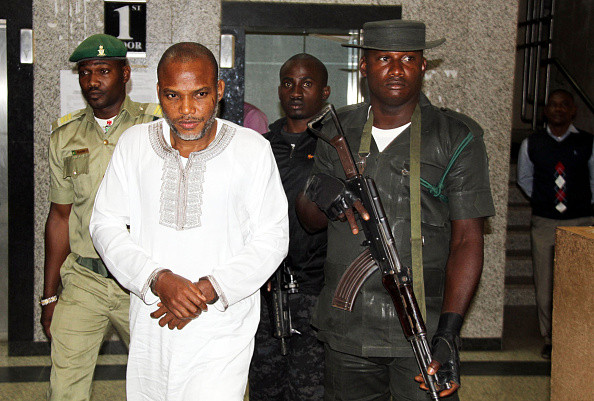Nnamdi Kanu: Ecowas adjourns trial on Ipob leader's detention as government absent in court
Kanu sued federal government arguing continued detention without trial was a violation of his human rights.
The trial on the continued detention of Nnamdi Kanu – leader of a secessionist movement that wants to break away from Nigeria – has been adjourned to 8 November. The Economic Community of West African States (Ecowas) court of justice, in the capital Abuja, postponed the case after the Nigerian government and its legal representatives failed to appear in court on 6 October.
The government explained it could not attend as it had a conflicting case in another court, the Premium Times newspaper reported.
Kanu, leader of the Indigenous People of Biafra (Ipob), is standing trial on six counts of treasonable felony charges. He was arrested on conspiracy and terrorism charges, which were later dropped, in Lagos in October 2015.
The Abuja High Court initially ruled in favour of granting bail to Kanu, who denied all the charges against him. However, in December 2015, President Muhammadu Buhari said the Ipob leader would not be released amid fears he could jump bail and flee to the UK, as he holds both a British and a Nigerian passport.
In response, Kanu and his legal representatives sued the federal government arguing that his continued detention was a violation of his human rights. Kanu asked for $800m ( $646m) in compensation.
In a statement released earlier in October, Ipob explained it had decided to approach the Ecowas court "to seek justice for him [Kanu] since the courts in Nigeria have decided not to give him justice, in order to please their masters who have written the scripts the courts are playing."
Kanu's trial on treasonable felony charges suffered another setback after Judge John Tsoho stepped down in September. He was the second judge to have withdrawn from the case since December 2015.
Kanu's defence has not been able to proceed with the case due to several obstacles – that Kanu's supporters have deemed as tactical, in order to keep their leader in detention for an indefinite time. Both Tsoho and the federal governement have denied the allegations.
It is unclear how long the process to appoint a new judge will take. However, some lawyers have pointed out that judges are reluctant to take cases that colleagues have withdrawn from "because it would appear as if judges are passing buck."
Pro-Biafrans call for the independence of Biafran territories, forcibly annexed to modern-day Nigeria during British colonisation, which ended in 1960.
IBTimes UK's exclusive interview with Kanu's wife
My husband must know we are fighting worldwide for his release
Nnamdi Kanu is not renouncing Biafra
'My husband is a prisoner of conscience'
A Biafran Republic was established in 1967 but re-annexed to Nigeria in 1970, following a bloody civil war that claimed millions of lives. Calls for a breakaway have continued since.
The Nigerian government has always maintained that Nigeria's unity was a priority for the country and, that although peaceful pro-Biafran protests were welcome, demanding the breakaway of the Biafran territories went against the constitution.
Nigeria up close: Check out our Flipboard magazine

© Copyright IBTimes 2025. All rights reserved.





















